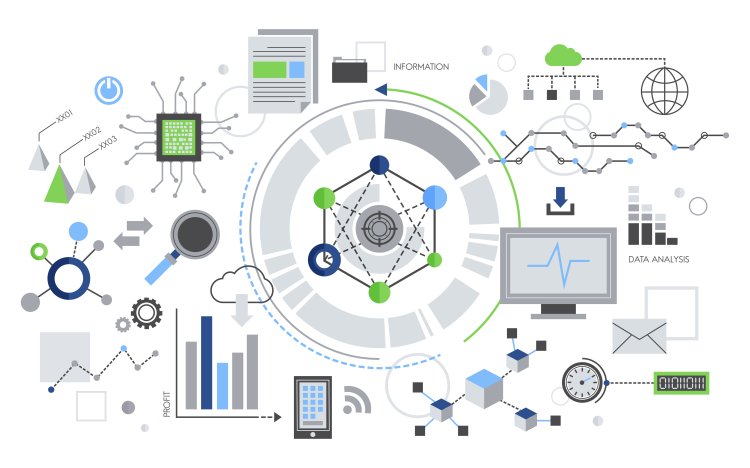Challenges and Solutions in Digital Transformation for Manufacturing Companies
This article explores the challenges manufacturing companies face in adopting digital transformation, including legacy systems integration, data management, cybersecurity risks, skill gaps, and cultural shifts. It provides practical solutions such as strategic planning, technology adoption, data governance, cybersecurity measures, workforce training, and leadership engagement to overcome these challenges.
Share this Post to earn Money ( Upto ₹100 per 1000 Views )

Digital transformation has emerged as a crucial initiative for manufacturing companies aiming to enhance efficiency, agility, and competitiveness in today's rapidly evolving market landscape. This article explores the key challenges faced by manufacturing companies in their digital transformation journey and offers practical solutions to overcome them.
What is DT in Manufacturing
Digital transformation in manufacturing refers to the adoption and integration of digital technologies across all aspects of manufacturing processes and operations. It involves leveraging advanced technologies such as Internet of Things (IoT), Artificial Intelligence (AI), big data analytics, cloud computing, robotics, and automation to optimize efficiency, improve decision-making, and innovate products and services. DT in manufacturing aims to enhance agility, responsiveness to customer demands, and overall competitiveness in a rapidly evolving global market.
Challenges in Digital Transformation for Manufacturing Companies
-
Legacy Systems Integration: Many manufacturing companies operate with legacy systems that are not designed to support modern digital technologies such as IoT (Internet of Things), AI (Artificial Intelligence), and advanced analytics. Integrating these new technologies with existing infrastructure can be complex and costly.
-
Data Management and Integration: Manufacturing generates vast amounts of data from machines, sensors, and processes. Managing and integrating this data into actionable insights poses challenges related to data quality, interoperability, and scalability.
-
Cybersecurity Risks: As manufacturing systems become more interconnected through IoT and cloud computing, the risk of cyber threats increases. Ensuring robust cybersecurity measures to protect sensitive data and operational integrity is paramount.
-
Skill Gaps and Workforce Training: Adopting new digital technologies requires a workforce skilled in areas such as data analytics, AI, and cybersecurity. Many manufacturing companies face challenges in upskilling their workforce and overcoming resistance to technological change.
-
Cost and ROI Concerns: Digital transformation initiatives often involve significant upfront investments in technology infrastructure, software licenses, and training. Manufacturers need to justify these costs by demonstrating tangible returns on investment (ROI) and operational improvements.
-
Change Management and Cultural Shifts: Successfully implementing digital transformation requires a cultural shift towards innovation, agility, and data-driven decision-making. Resistance to change and lack of leadership support can hinder adoption and implementation efforts.
Solutions to Overcome Challenges in Digital Transformation
1. Strategic Roadmap and Prioritization
- Assessment and Planning: Conduct a thorough assessment of current capabilities, identify digital transformation goals, and develop a strategic roadmap with clear milestones and timelines.
- Prioritize Initiatives: Focus on high-impact initiatives that align with business objectives and have the potential to deliver quick wins and demonstrable ROI.
2. Technology Adoption and Integration
- Choose Scalable Technologies: Select digital technologies that are scalable, interoperable, and aligned with long-term business goals. Invest in platforms that support integration with existing systems.
- Pilot Projects: Start with pilot projects to test new technologies in controlled environments before full-scale implementation. Use pilot results to refine strategies and mitigate risks.
3. Data Management and Analytics
- Data Governance: Establish robust data governance frameworks to ensure data quality, security, and compliance with regulatory requirements.
- Advanced Analytics: Leverage AI and machine learning algorithms to derive actionable insights from data for predictive maintenance, process optimization, and decision support.
4. Cybersecurity and Risk Mitigation
- Comprehensive Security Measures: Implement multi-layered cybersecurity measures, including encryption, access controls, network segmentation, and continuous monitoring.
- Employee Training: Educate employees on cybersecurity best practices and create a culture of vigilance and accountability across the organization.
5. Skill Development and Talent Acquisition
- Upskilling Programs: Invest in training and upskilling programs to equip employees with digital skills required for new technologies and processes.
- Collaboration and Partnerships: Partner with educational institutions, industry associations, and technology vendors to bridge skill gaps and attract top talent.
6. Change Management and Leadership Engagement
- Leadership Alignment: Secure buy-in and support from executive leadership to drive cultural change and foster a culture of innovation and continuous improvement.
- Communication and Stakeholder Engagement: Communicate the benefits of digital transformation initiatives transparently and engage stakeholders at all levels of the organization.
Conclusion
Digital transformation presents manufacturing companies with unprecedented opportunities to enhance operational efficiency, innovate product offerings, and deliver superior customer experiences. However, overcoming challenges such as legacy systems integration, data management complexities, cybersecurity risks, skill gaps, and cultural shifts requires a strategic and holistic approach.
By prioritizing strategic initiatives, investing in scalable technologies, strengthening data governance, enhancing cybersecurity measures, upskilling the workforce, and fostering a culture of innovation, manufacturing companies can successfully navigate their digital transformation journey. Embracing digital transformation not only positions manufacturers for long-term growth and competitiveness but also ensures resilience in a rapidly evolving global marketplace.

 veronicablogz
veronicablogz 






